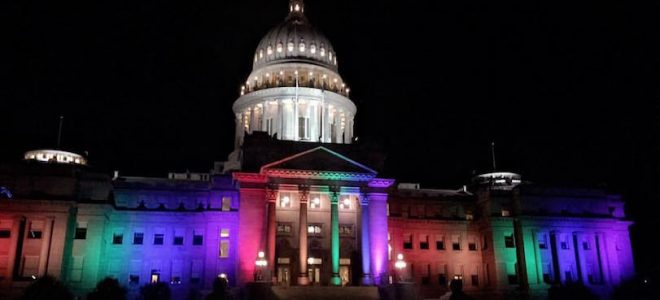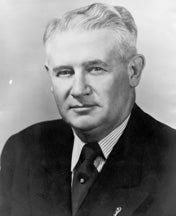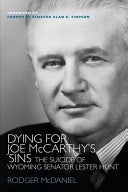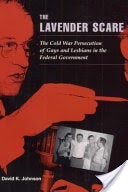

Marc C. Johnson served as press secretary and chief of staff to Idaho’s only four-term governor Cecil D. Andrus.
Rampant gay baiting, driven by McCarthy, Bridges, Welker, spurred senator’s suicide
In June 1954 Drew Pearson, the widely read and frequently feared author of a syndicated political column entitled “Washington Merry-Go-Round” published a sensational piece. Pearson alleged that two Republican United States senators – Styles Bridges of New Hampshire and Herman Welker of Idaho – had attempted to blackmail a fellow senator, Wyoming Democrat Lester Hunt, and that the threats led directly to Hunt’s suicide.
Hunt, a remarkably successful politician from Lander, had served in the state legislature, as Wyoming’s secretary of state, governor and United States senator. He was expected to easily win re-election in 1954 before he abruptly and surprisingly withdrew from the race. A few days later, a quiet Saturday morning, Hunt walked to his Senate office with a .22 caliber Winchester rifle barely concealed beneath his overcoat. Minutes later Hunt shot himself. He died a few hours later. His death stunned Washington and Wyoming. The official explanation was that Hunt had grown despondent over a health condition, but Drew Pearson knew Hunt’s real motivation.

As he recounted in his column after the Wyoming senator’s suicide, “On one occasion, Republican Senator Herman Welker of Idaho had sent word to Hunt that if he would not run for re-election, his son, arrested on a morals charge, would not be prosecuted.” Pearson, who had seen his share of political sleaze, said the blackmail attempt “was one of the lowest types of political pressure this writer has seen in many years.”
As it turned out, Hunt’s son — Lester, Jr. — was prosecuted and fined for soliciting a male, undercover police officer, but the prosecution took place only after the story of his arrest was leaked to a Washington newspaper and after Welker and Bridges called a Washington, D.C., detective to Capitol Hill to pressure him to pursue the prosecution. The incident, overshadowed at the time by the shocking suicide of a United States Senator, was of a pattern with the McCarthy era’s widespread persecution of gay and lesbian Americans.
In the wake of both the blackmail attempt and publicity about his son, Senator Hunt debated whether to withdraw from his re-election campaign, but initially refused to do so, telling friends he could not stand the idea of being blackmailed out of politics. But, Welker and Bridges, likely acting in coordination with their close friend Joe McCarthy, and hoping to experience a Republican pick up of Hunt’s seat – Republicans held only a two seat majority in the Senate – wanted him out of the race and they continued the pressure.
Word was passed to Hunt by a Wyoming friend – a mutual friend of Welker’s – that he could expect his son’s “problems” to be made the major issue in his re-election unless he quit. At the time McCarthy hinted to reporters that he was aware of blockbuster charges that could sink the career of an unnamed senator. McCarthy suggested, in an almost complete reverse of what had actually happened, that the unnamed senator was guilty of “bribing” a police officer to not pursue a prosecution.

After the Pearson column appeared, Welker and Bridges immediately denied any involvement in Hunt’s suicide and each denounced the columnist. Only years later when a former Wyoming state legislator, Rodger McDaniel, published his book Dying for Joe McCarthy’s Sins: The Suicide of Wyoming Senator Lester Hunt did all the pieces of the sordid events finally come together.
McDaniel recounts that Hunt confided to one friend, William Spencer, the details of the threats he received from Welker and Bridges and when both senators attended Hunt’s memorial service and spoke briefly, Spencer was outraged at what he considered their cynicism and lack of shame. Spenser wrote to Welker, and also copied Bridges, that he was well aware of “the diabolical part you played following the unfortunate and widely publicized episode in which [Hunt’s] son was involved.” Spenser said Welker had taken advantage “of the misery which the poor fellow was suffering” purely to turn it to political advantage. A copy of Spencer’s scathing letter is in Bridges’ Senate archives. There is no record that Welker responded.
As the official Senate Historian has noted, “No one associated with the Senate in 1954 would ever forget the trauma of [Hunt’s death]. The event influenced a classic work of American political literature, Allen Drury’s Senate-based novel Advise and Consent. Working on the book when he learned of Hunt’s suicide, Drury changed the plot to have his character, Senator Brigham Anderson, commit suicide in the face of lies about his moral conduct by his tormentor, a thinly disguised Senator McCarthy.”
The McCarthy Era’s often unscrupulous and frequently unfair search for Communists or those deemed “un-American” is widely known. It is less well known that the climate of fear McCarthy and his supporters helped stoke also involved widespread persecution of gay and lesbian Americans. By one count more than 5,000 federal employees suspected of homosexuality were fired in the 1950s in the name of protecting “national security.”

The infamous McCarthy Era question, “Are you now or have you ever been a member of the Communist Party?” not infrequently led to another line of inquiry. As historian David K. Johnson documented in his 2004 book The Lavender Scare, those inquires began with, “Information has come to the attention of the Civil Service Commission that you are a homosexual. What comment do you care to make?”
The excesses of the McCarthy Era had many victims and the shocking death of Senator Lester Hunt in 1954 remains a chilling reminder of how political passions in a time of unreasoning fear can lead not only to a trampling of civil liberties, but to even more tragic consequences.